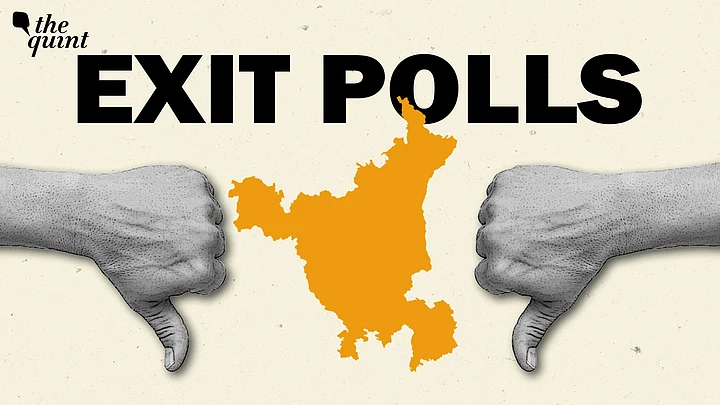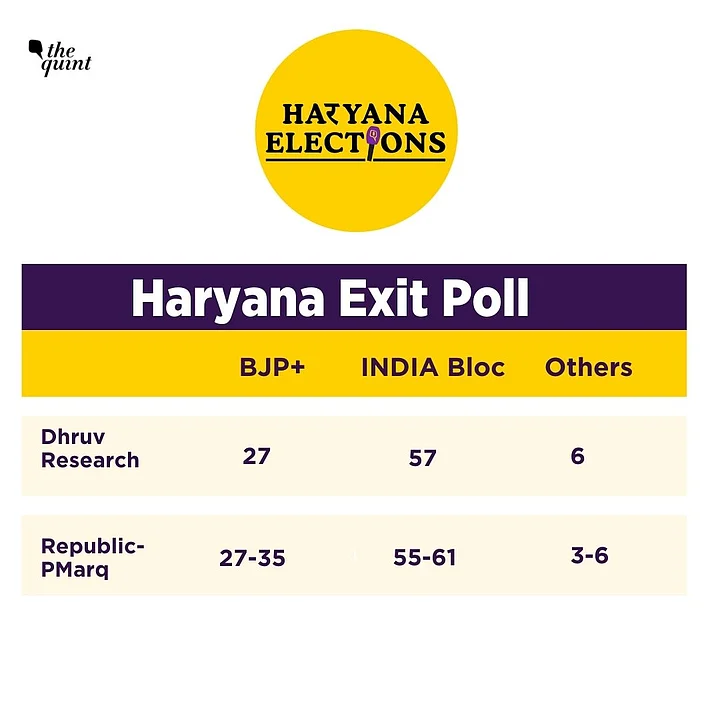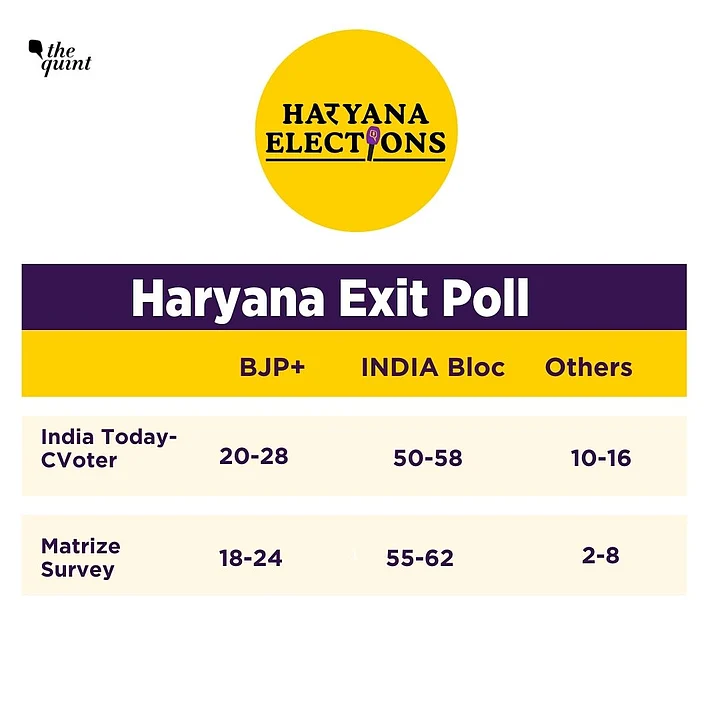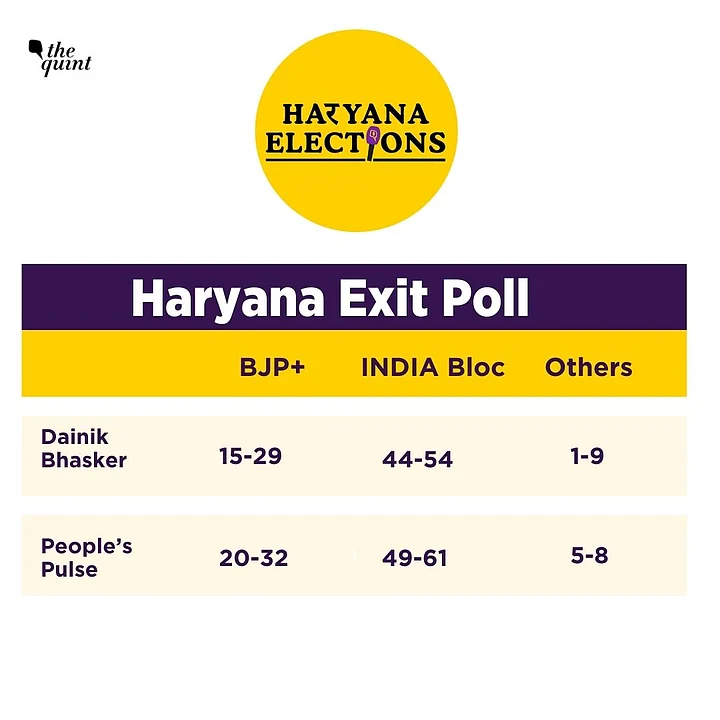The ultimate sin for any pollster is to get even the direction of an election wrong. Getting the final tally wrong is still fine but if they go wrong on who's winning overall, then it is nothing short of an embarrassment. In the recently concluded Haryana Assembly elections, many survey agencies ended up making this mistake - they predicted a decisive win for the Congress but in the end it is the BJP which won a clear victory.
At the time of writing this story, the party had won or was leading in 48 seats, up 8 seats from the 40 it won in 2019.
The question is why did the polls go wrong? There are a number of reasons for this.
But first, a brief recollection of what they had predicted
Haryana Election Results: Why Did Exit Polls Go So Wrong? 7 Possible Reasons
1. Exit Polls That Aren't Really Exit Polls
A survey is considered an exit poll when the surveyor interviews people outside the polling station just after they have come out after casting their votes. What many of the survey agencies did in Haryana aren't exit polls but post-poll surveys, meaning they interviewed people after the polling has taken place but not necessarily outside the polling booth. It could have been at their homes or in the market place.
Then some agencies also combine the pre-poll and post-poll samples and present a consolidated analysis. Some agencies like CVoter mention this in a transparent manner and specify that their polls aren't exit polls and they call them merely surveys. However, many other agencies conceal this fact.
This error often leads to mistakes in predictions.
Expand2. Polls End Up Missing Voting Day Mobilisation
If Exit Polls aren't conducted right outside the polling station, then they may not be able to capture mobilsation that takes place on polling day. This mobilsation plays a crucial role in deciding the final results. BJP in particular is very good at mobilsation on polling day, by virtue of its superior cadre strength.
This is one of the reasons why BJP has been successful in maintaining a stable vote share in many states.
Pre-poll surveys naturally do not factor in this. Even post-poll surveys that aren't conducted outside polling stations often do not reflect the voters who actually came and voted. They give a sense of the general mood among the electorate but are often inaccurate in predicting results.
Expand3. Vote Share to Seat Share Conversion
Many seasoned polling agencies - like CSDS - are often reluctant in making seat predictions and instead choose to make vote share predictions only. The reason for this is that the sample size in each seat may not be high enough to make an accurate prediction. Some surveys take the vote share data and extrapolate it to make seat predictions. This is a tricky approach and often leads to wrong predictions.
In the case of Haryana, for instance, both BJP and Congress had roughly the same vote share: 39-40 percent. So a direct extrapolation of this would be an equal split in terms of seats. But that's not how it works on the ground. The BJP was non-existent in many seats such as Baroda, Dabwali, Ellenabad, Gannaur, Hisar, Meham, Nuh, Punahana, Rania and Sirsa. The Congress on the other hand had some presence across almost all seats but not dominant enough in many of these seats. Therefore it ended up losing a larger number of seats by smaller margins, while BJP lost a small number of seats with larger margins and won more seats than the Congress.
At least in the past 10 years or so, BJP has been effective in establishing dominance over seats where they have a competitive presence. The Congress has struggled to do that.
Expand4. Dominant Community Bias
In Haryana, a great deal of the perception that the BJP is losing, was created by the fact that a sizable section of the Jat community was openly speaking out against it. Jats were also at the forefront of three major protests against the BJP: the Jat reservation protest, the wrestler protest and the farmers' protest. As Jats are Haryana's largest community at around 25 percent and have dominated the state's politics, it is natural that they are the most vocal and politically assertive.
Two aspects often get missed because of this:
The counter-consolidation among non-Jat communities. Communities like Ahirs, Extremely Backward Castes, Punjabis, Brahmins, Baniyas and Rajputs all seem to have consolidated behind the BJP and one of the factors behind it is the fear of Jat domination. This often takes place silently as people sometimes don't want to openly speak out against assertive communities. As a result surveys often end up missing this.
If the narrative within a community is so decisively against a party, surveys also often end up underestimating the silent support the party may have from within sections of the community. A section of Jats in Haryana do vote for BJP either due to ideological reasons or due to local candidates. But surveys may have missed this as the dominant narrative in the community was against BJP.
Expand5. Exit Polls and Surveys Underestimate 'Others'
Smaller parties and Independents being underestimated by pollsters is a very common trend. The only way this can be prevented is if the survey agencies have a robust sample size in each seat. But that would mean the overall sample size in all the seats put together would become massive and involve huge expenses. It is possible that a chunk of the votes that the surveys considered as pro-Congress, ended up going towards others. This may particularly be the case among Jat and Dalit voters, two communities which the Congress was hoping to consolidate.
Expand6. Surveys Can't Catch Internal Sabotage
Sometimes factional disputes within parties lead to localised attempts at sabotage. For instance, it is possible that if a party has two claimants for the CM's post, the supporters of one may try to harm the chances of a candidate loyal to the other. This is something that surveys will find it difficult to catch. It is possible that this may have happened regarding the Haryana Congress - that a few seats which the party was predicted to win as per surveys, it ended up losing due to sabotage or simply lack of coordination.
Expand7. The Problem of Momentum
When there is a strong swing in favour of the challenger party, it becomes difficult to estimate whether it would be enough to defeat the incumbent or not. In the case of Haryana for example, the Congress' vote share increased by 11 percentage points compared to 2019, which is a massive swing by any standards. Naturally, this positive swing would have been reflected in any accurate survey or even ground reportage.
Most estimates would have factored at least part of this gain coming at the BJP's expense. Not many would have expected that this entire gain would be at the expense of smaller parties and it won't harm BJP at all.
A similar thing happened in the 2017 Gujarat election, in which the Congress gained hugely but the BJP didn't lose its vote share even one bit. Such trends are not easy to catch.
(At The Quint, we question everything. Play an active role in shaping our journalism by becoming a member today.)
Expand
Exit Polls That Aren't Really Exit Polls
A survey is considered an exit poll when the surveyor interviews people outside the polling station just after they have come out after casting their votes. What many of the survey agencies did in Haryana aren't exit polls but post-poll surveys, meaning they interviewed people after the polling has taken place but not necessarily outside the polling booth. It could have been at their homes or in the market place.
Then some agencies also combine the pre-poll and post-poll samples and present a consolidated analysis. Some agencies like CVoter mention this in a transparent manner and specify that their polls aren't exit polls and they call them merely surveys. However, many other agencies conceal this fact.
This error often leads to mistakes in predictions.
Polls End Up Missing Voting Day Mobilisation
If Exit Polls aren't conducted right outside the polling station, then they may not be able to capture mobilsation that takes place on polling day. This mobilsation plays a crucial role in deciding the final results. BJP in particular is very good at mobilsation on polling day, by virtue of its superior cadre strength.
This is one of the reasons why BJP has been successful in maintaining a stable vote share in many states.
Pre-poll surveys naturally do not factor in this. Even post-poll surveys that aren't conducted outside polling stations often do not reflect the voters who actually came and voted. They give a sense of the general mood among the electorate but are often inaccurate in predicting results.
Vote Share to Seat Share Conversion
Many seasoned polling agencies - like CSDS - are often reluctant in making seat predictions and instead choose to make vote share predictions only. The reason for this is that the sample size in each seat may not be high enough to make an accurate prediction. Some surveys take the vote share data and extrapolate it to make seat predictions. This is a tricky approach and often leads to wrong predictions.
In the case of Haryana, for instance, both BJP and Congress had roughly the same vote share: 39-40 percent. So a direct extrapolation of this would be an equal split in terms of seats. But that's not how it works on the ground. The BJP was non-existent in many seats such as Baroda, Dabwali, Ellenabad, Gannaur, Hisar, Meham, Nuh, Punahana, Rania and Sirsa. The Congress on the other hand had some presence across almost all seats but not dominant enough in many of these seats. Therefore it ended up losing a larger number of seats by smaller margins, while BJP lost a small number of seats with larger margins and won more seats than the Congress.
At least in the past 10 years or so, BJP has been effective in establishing dominance over seats where they have a competitive presence. The Congress has struggled to do that.
Dominant Community Bias
In Haryana, a great deal of the perception that the BJP is losing, was created by the fact that a sizable section of the Jat community was openly speaking out against it. Jats were also at the forefront of three major protests against the BJP: the Jat reservation protest, the wrestler protest and the farmers' protest. As Jats are Haryana's largest community at around 25 percent and have dominated the state's politics, it is natural that they are the most vocal and politically assertive.
Two aspects often get missed because of this:
The counter-consolidation among non-Jat communities. Communities like Ahirs, Extremely Backward Castes, Punjabis, Brahmins, Baniyas and Rajputs all seem to have consolidated behind the BJP and one of the factors behind it is the fear of Jat domination. This often takes place silently as people sometimes don't want to openly speak out against assertive communities. As a result surveys often end up missing this.
If the narrative within a community is so decisively against a party, surveys also often end up underestimating the silent support the party may have from within sections of the community. A section of Jats in Haryana do vote for BJP either due to ideological reasons or due to local candidates. But surveys may have missed this as the dominant narrative in the community was against BJP.
Exit Polls and Surveys Underestimate 'Others'
Smaller parties and Independents being underestimated by pollsters is a very common trend. The only way this can be prevented is if the survey agencies have a robust sample size in each seat. But that would mean the overall sample size in all the seats put together would become massive and involve huge expenses. It is possible that a chunk of the votes that the surveys considered as pro-Congress, ended up going towards others. This may particularly be the case among Jat and Dalit voters, two communities which the Congress was hoping to consolidate.
Surveys Can't Catch Internal Sabotage
Sometimes factional disputes within parties lead to localised attempts at sabotage. For instance, it is possible that if a party has two claimants for the CM's post, the supporters of one may try to harm the chances of a candidate loyal to the other. This is something that surveys will find it difficult to catch. It is possible that this may have happened regarding the Haryana Congress - that a few seats which the party was predicted to win as per surveys, it ended up losing due to sabotage or simply lack of coordination.
The Problem of Momentum
When there is a strong swing in favour of the challenger party, it becomes difficult to estimate whether it would be enough to defeat the incumbent or not. In the case of Haryana for example, the Congress' vote share increased by 11 percentage points compared to 2019, which is a massive swing by any standards. Naturally, this positive swing would have been reflected in any accurate survey or even ground reportage.
Most estimates would have factored at least part of this gain coming at the BJP's expense. Not many would have expected that this entire gain would be at the expense of smaller parties and it won't harm BJP at all.
A similar thing happened in the 2017 Gujarat election, in which the Congress gained hugely but the BJP didn't lose its vote share even one bit. Such trends are not easy to catch.
(At The Quint, we question everything. Play an active role in shaping our journalism by becoming a member today.)



